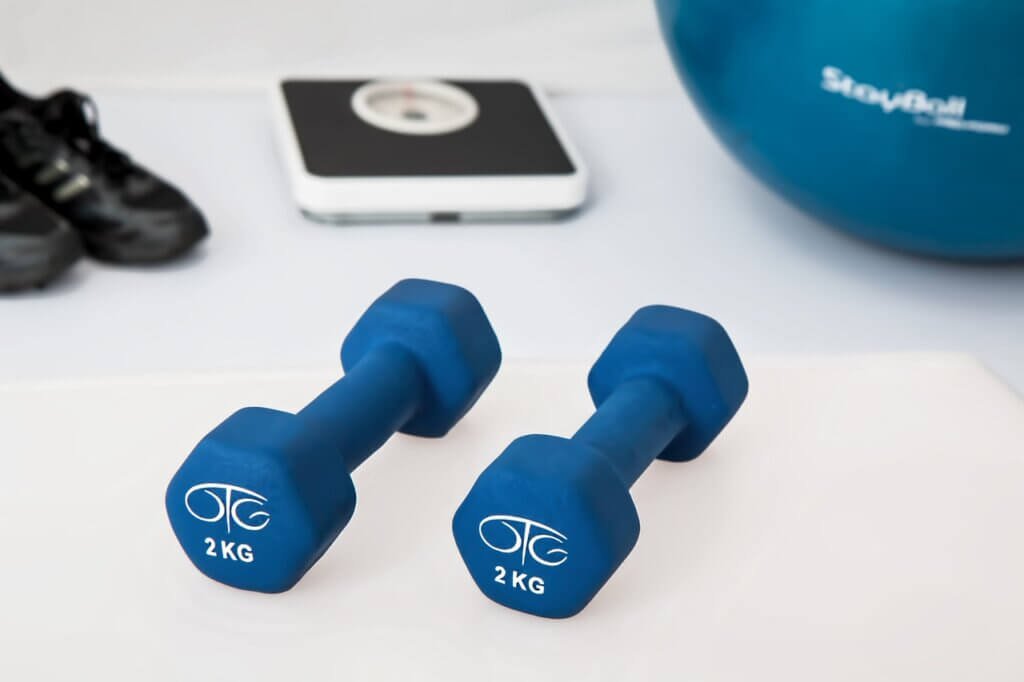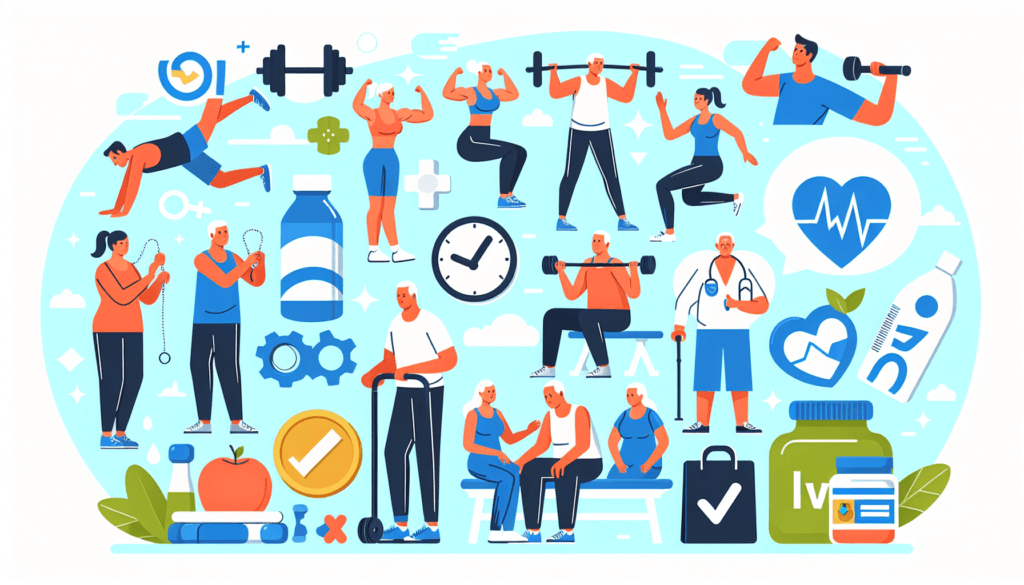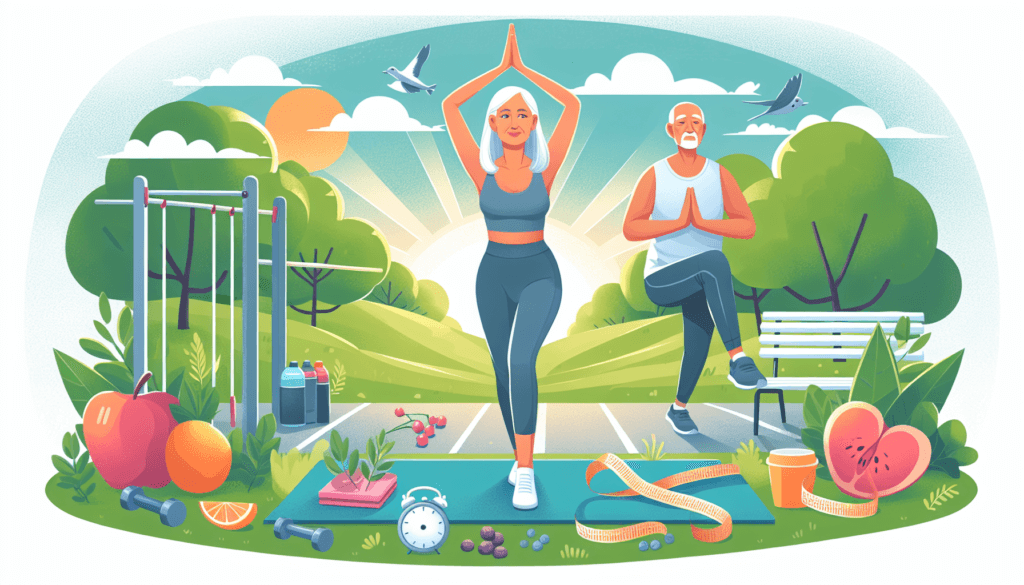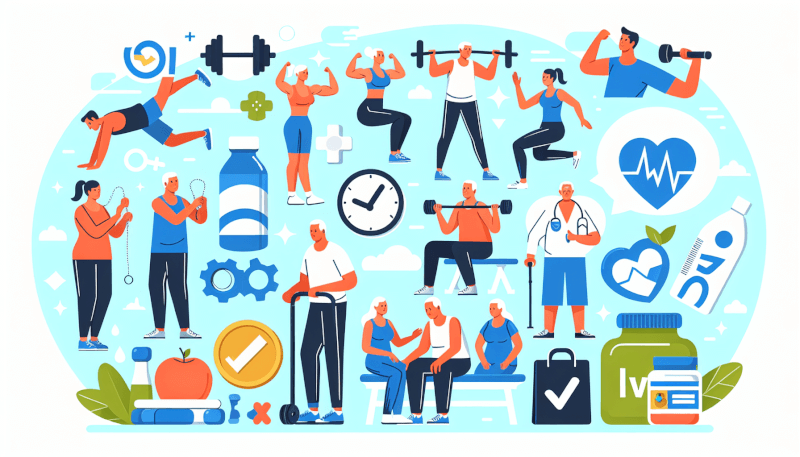As you age, it becomes increasingly important to take care of your physical health and maintain strength and fitness. In this article, we will explore various strategies and tips to help you stay active, healthy, and strong as you get older. From maintaining a regular exercise routine to prioritizing proper nutrition and adopting healthy habits, we will provide you with practical advice to ensure your physical well-being remains a priority as you age. So, let’s dive into the world of aging gracefully and staying physically fit and strong!

Importance of Physical Fitness and Strength as You Age
As you age, maintaining physical fitness and strength becomes increasingly important for your overall health and well-being. Engaging in regular exercise and strength-building activities can help you maintain a healthy lifestyle, prevent common aging issues, and improve your mental and emotional well-being. In this article, we will explore various strategies and techniques to help you create a comprehensive fitness routine, prioritize proper warm-up and cool-down exercises, build strength and endurance, adopt a healthy diet and nutrition plan, prioritize mental and emotional well-being, listen to your body, prioritize sleep, schedule regular health check-ups, and stay motivated and accountable to your fitness goals.
Maintaining a Healthy Lifestyle
Maintaining a healthy lifestyle is the foundation for staying physically fit and strong as you age. It involves making conscious choices about your diet, physical activity, and overall well-being. It is essential to prioritize regular exercise, nutritious meals, adequate sleep, and stress management to achieve optimal health and fitness. By incorporating these habits into your daily routine, you can significantly improve your physical fitness and overall quality of life.
Understanding the Benefits of Exercise
Exercise offers numerous benefits as you age. Regular physical activity helps improve cardiovascular health, increase bone density, enhance mobility and flexibility, boost mood and cognitive function, and reduce the risk of chronic diseases such as diabetes, heart disease, and osteoporosis. Engaging in activities like walking, swimming, cycling, strength training, and yoga can help keep your body strong and functional, allowing you to enjoy an active and independent lifestyle as you grow older.
Preventing Common Aging Issues
Regular exercise and physical fitness can also help prevent common aging issues. As you age, you may experience a decline in muscle mass, bone density, and flexibility. However, with consistent strength and conditioning exercises, you can slow down these age-related changes and maintain your physical abilities. Physical fitness can also help reduce the risk of falls, improve balance and coordination, and prevent age-related cognitive decline. By incorporating exercises that target specific muscle groups and addressing common aging issues, you can minimize the impact of aging on your overall health and well-being.
Creating Your Fitness Routine
Creating a personalized fitness routine is essential to meet your specific needs and goals. Before starting any exercise program, it is crucial to consult with a healthcare professional, especially if you have any pre-existing medical conditions or concerns. They can provide guidance on the types and intensity of exercises that are safe and suitable for your age, health, and fitness level.
Consulting a Healthcare Professional
Consulting a healthcare professional before embarking on your fitness journey is crucial. They can assess your current health status, identify any underlying health conditions, and provide guidance on the most appropriate exercise program for your specific needs. By seeking professional advice, you can ensure your fitness routine is safe, effective, and tailored to your individual circumstances.

Setting Realistic Goals
Setting realistic goals is essential for maintaining motivation and progress in your fitness journey. Consider your current fitness level, age, and any specific health concerns when setting your goals. Start with small, achievable targets and gradually increase the intensity and duration of your workouts over time. Remember that consistency and gradual progress are key to long-term success.
Choosing Suitable Activities
Choosing suitable activities that align with your interests and physical abilities is crucial for maintaining your fitness routine. Engage in activities that you enjoy, such as walking, swimming, dancing, or participating in group exercise classes. Vary your workouts to avoid boredom and target different muscle groups. You can also seek guidance from fitness professionals or join fitness communities to discover new activities and exercises that suit your preferences and goals.
Proper Warm-up and Cool-down
Proper warm-up and cool-down exercises are vital components of any fitness routine. Warming up prepares your body for physical activity by increasing blood flow to your muscles and joints, raising your body temperature, and improving range of motion. Cooling down, on the other hand, allows your body to gradually return to its pre-exercise state and reduces the risk of post-workout dizziness or muscle soreness.
The Importance of Warming Up
Warming up before exercise is crucial to prevent injuries and improve performance. It prepares your cardiovascular system, increases the flexibility of your muscles and joints, and enhances your overall exercise experience. Dedicate at least 10 minutes to warm-up exercises, which can include light cardio exercises like jogging, jumping jacks, or cycling, followed by dynamic stretches to activate major muscle groups.
Effective Warm-up Exercises
Include a variety of warm-up exercises to target different muscle groups and prepare your body for the intended workout. For cardio exercises, including jogging in place, high knees, or jump rope. For resistance training, perform bodyweight exercises like squats, lunges, or push-ups. Additionally, dynamic stretches such as arm circles, leg swings, and hip rotations can help improve flexibility and reduce the risk of muscle strains or tears.
Essential Cooling-down Techniques
After completing your workout, it is crucial to perform a proper cool-down to gradually reduce your heart rate, prevent dizziness, and aid in muscle recovery. Allocate 10 minutes for gentle cardio exercises such as walking or slow cycling, followed by static stretches to lengthen and relax your muscles. Focus on stretching major muscle groups like your hamstrings, quadriceps, calves, and shoulders, holding each stretch for at least 30 seconds.

Building Strength and Endurance
Building strength and endurance is essential for maintaining functional independence and preventing age-related muscle loss. Incorporating a combination of resistance training, cardiovascular exercises, flexibility workouts, and balance exercises into your fitness routine can help you achieve optimal strength and endurance levels.
Incorporating Resistance Training
Resistance training, or strength training, involves using weights, resistance bands, or body weight to build muscle strength and endurance. It is crucial for maintaining bone density, increasing lean muscle mass, and improving overall functional abilities. Include exercises that target major muscle groups, such as squats, lunges, deadlifts, chest presses, and rows. Start with lighter weights and gradually increase the resistance as you gain strength.
Emphasizing Cardiovascular Exercises
Cardiovascular exercises, also known as aerobic exercises, are essential for improving heart health, enhancing lung capacity, and burning calories. Engaging in activities like brisk walking, jogging, cycling, swimming, or dancing can help increase your cardiovascular endurance and improve overall fitness. Aim for at least 150 minutes of moderate-intensity cardio exercise per week, or 75 minutes of vigorous-intensity exercise if your health allows.
Including Flexibility and Balance Workouts
Flexibility and balance workouts are often overlooked but play a crucial role in maintaining mobility and preventing falls as you age. Incorporate exercises like yoga, Pilates, tai chi, or simple stretching routines into your fitness routine to improve flexibility, joint mobility, and balance. These activities also help reduce muscle stiffness, improve posture, and enhance overall body awareness.
Healthy Diet and Nutrition
A healthy diet and proper nutrition are fundamental for supporting your physical fitness and overall well-being. Fueling your body with nutrient-dense foods and maintaining a balanced diet can help optimize your energy levels, support muscle recovery, and reduce the risk of chronic diseases.
Fueling Your Body
Providing your body with adequate fuel is crucial for optimal physical performance. Aim to consume a balance of macronutrients, including carbohydrates, proteins, and healthy fats, to maintain energy levels. Prioritize whole foods such as fruits, vegetables, lean proteins, whole grains, nuts, and seeds. Hydration is also key, so make sure to drink plenty of water throughout the day.

Importance of a Balanced Diet
A balanced diet ensures that your body receives essential vitamins, minerals, and nutrients to maintain overall health and well-being. Aim to include a variety of food groups in your meals, focusing on lean proteins, whole grains, colorful fruits and vegetables, and healthy fats. Limit your consumption of processed foods, sugary snacks, and excessive sodium or saturated fats.
Supplementing with Vitamins and Minerals
While a balanced diet is the foundation of good nutrition, it may be necessary to supplement certain vitamins and minerals, especially as you age. Consult with a healthcare professional or a registered dietitian to identify any nutrient deficiencies and determine if supplementation is necessary. Common supplements for older adults may include vitamin D, calcium, omega-3 fatty acids, or specific antioxidant-rich supplements.
Maintaining Mental and Emotional Well-being
Physical fitness goes hand in hand with mental and emotional well-being. Engaging in activities that promote mindfulness, connecting with others, and seeking professional help when needed can help you maintain a positive mindset and emotional resilience as you age.
Practicing Mindfulness and Meditation
Practicing mindfulness and meditation can help reduce stress, improve focus, and enhance overall well-being. Set aside a few minutes each day to engage in mindful activities such as deep breathing exercises, guided meditation, or yoga. These practices can increase self-awareness, promote relaxation, and improve mental clarity.
Engaging in Social Activities
Engaging in social activities is crucial for maintaining mental and emotional well-being. Join social groups, participate in community events, or stay connected with friends and family to combat feelings of loneliness or isolation. Social interactions provide a sense of belonging, support, and companionship, contributing to overall happiness and well-being.
Seeking Professional Help if Needed
If you are experiencing persistent feelings of sadness, anxiety, or other mental health concerns, do not hesitate to seek professional help. Mental health support is essential for maintaining overall well-being, and mental health professionals can provide guidance, therapy, or treatments tailored to your specific needs.

Listening to Your Body
Listening to your body is essential for maintaining a safe and effective fitness routine as you age. It involves paying attention to physical signs and adjusting your workouts accordingly to prevent injury, overexertion, or fatigue.
Recognizing Signs of Overexertion
Be mindful of signs of overexertion, such as extreme fatigue, dizziness, shortness of breath, chest pain, or intense muscle soreness. Pushing yourself too hard without proper rest or recovery can lead to injuries or burnout. If you experience any of these symptoms, it is important to take a break, listen to your body, and modify your exercises or seek medical advice if needed.
Adjusting and Modifying Your Workout
As your body changes with age, it is important to adjust and modify your workouts accordingly. Consider any physical limitations or health conditions you may have and adapt your exercises to support your individual needs. This could involve using lighter weights, reducing the intensity or duration of your workouts, or incorporating low-impact exercises to protect your joints.
Allowing for Rest and Recovery
Rest and recovery are integral parts of any fitness routine. As you age, it may take longer for your body to recover from workouts, so it is important to prioritize rest days. Allow your muscles time to repair and regenerate by incorporating rest days into your weekly routine. Also, ensure you are getting enough sleep each night to support optimal recovery and overall well-being.
Importance of Sleep
Sleep plays a crucial role in maintaining physical and mental health as you age. Establishing a consistent sleep schedule, creating a calming bedtime routine, and designing an optimal sleeping environment can help you improve the quality and quantity of your sleep.
Establishing a Consistent Sleep Schedule
Establishing a consistent sleep schedule is key to regulating your body’s sleep-wake cycle. Try to go to bed and wake up at the same time each day, even on weekends. This helps regulate your internal clock and promotes better sleep quality and daytime alertness.
Creating a Calming Bedtime Routine
Creating a calming bedtime routine helps signal to your body that it is time to wind down and prepare for sleep. Avoid stimulating activities or screens close to bedtime and instead engage in relaxing activities such as reading, taking a warm bath, or practicing relaxation techniques like deep breathing or stretching. Establishing a bedtime routine can help you transition from a state of wakefulness to restful sleep.
Creating an Optimal Sleeping Environment
Creating an optimal sleeping environment is essential for promoting quality sleep. Ensure your bedroom is dark, quiet, and at a comfortable temperature. Invest in a supportive mattress and pillows that suit your needs. Limit noise disruptions by using earplugs or a sound machine if necessary. By optimizing your sleeping environment, you can create the ideal conditions for restorative sleep.
Regular Health Check-ups
Regular health check-ups are essential for monitoring your overall health, detecting any potential issues, and seeking timely medical advice or treatment. Schedule preventive screenings, monitor your blood pressure and cholesterol levels, and seek medical advice whenever you have concerns about your health.
Scheduling Preventive Screenings
Scheduling regular preventive screenings can help detect potential health issues at an early stage, when they are often more manageable. Common screenings for older adults include blood pressure checks, cholesterol tests, cancer screenings, and bone density scans. Consult with your healthcare professional to determine the appropriate screenings for your age and risk factors.
Monitoring Blood Pressure and Cholesterol
Monitoring your blood pressure and cholesterol levels is important for preventing cardiovascular diseases, which become more prevalent as you age. High blood pressure and high cholesterol are often silent conditions, so regular check-ups with your healthcare provider are essential to identify any abnormalities and take appropriate measures to manage and control these risk factors.
Seeking Medical Advice when Needed
If you have any concerns about your health or experience new symptoms, it is important to seek medical advice promptly. Consulting with your healthcare provider can help diagnose and treat any underlying health conditions, provide guidance on managing chronic conditions, and ensure that you are receiving the necessary care for your overall well-being.
Staying Motivated and Accountable
Staying motivated and accountable to your fitness goals can be challenging, but it is crucial for ensuring long-term success. Finding a fitness buddy, tracking your progress, and rewarding yourself along the way can help you stay motivated and committed to your fitness journey.
Finding a Fitness Buddy
Finding a fitness buddy can provide much-needed support and accountability. Join fitness classes or activities that encourage group participation, or exercise with a friend or family member who shares similar fitness goals. Having someone to share your successes, challenges, and workouts with can make the journey more enjoyable and increase your commitment to regular exercise.
Tracking Your Progress
Tracking your progress is an effective way to stay motivated and monitor your improvements. Keep a workout log, use a fitness tracking app, or invest in a fitness wearable device to monitor your steps, distance covered, heart rate, or calorie burn. Celebrate the milestones reached and use your progress as a reminder of your commitment to a healthy and active lifestyle.
Rewarding Yourself
Rewarding yourself for achieving fitness milestones or sticking to your routine can help you stay motivated and focused on your goals. Treat yourself to a massage, a new workout gear, a special meal, or a day off to relax. By acknowledging and celebrating your achievements, you reinforce the positive behavior and increase your motivation to continue on your fitness journey.
In conclusion, staying physically fit and strong as you age is crucial for maintaining a healthy and fulfilling life. By creating a comprehensive fitness routine, prioritizing proper warm-up and cool-down exercises, building strength and endurance, adopting a healthy diet and nutrition plan, prioritizing mental and emotional well-being, listening to your body, prioritizing sleep, scheduling regular health check-ups, and staying motivated and accountable, you can enjoy an active and independent lifestyle as you age. Remember, it’s never too late to start prioritizing your physical fitness and strength, so start today and reap the numerous benefits for years to come.


